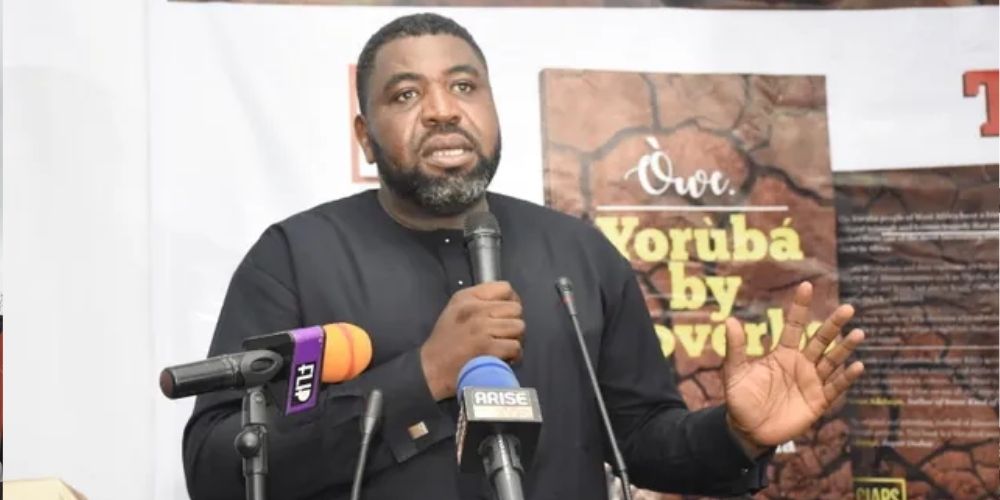PDP Crisis Signals Collapse Of National Civility, Institutional Order – Kila
Director of the Commonwealth Institute of Advanced and Professional Studies, Prof. Anthony Kila has warned that Nigeria is witnessing a national collapse of civility and institutional integrity, saying the chaos unfolding within the Peoples Democratic Party (PDP) is a symptom of a far deeper democratic decay.
Speaking on ARISE News on Wednesday, Kila said Tuesday’s confrontation at the PDP national secretariat was more than a party dispute but a stark display of how Nigeria’s political culture has deteriorated.
“What we saw yesterday is a show of shame. A complete breakdown of order in terms of the form of the process,” he said.
He argued that the disorder within the PDP marked by shouting matches, physical shoves and factional hostilities mirrors a wider collapse of discipline across Nigeria’s political class noting that party members are not like minded.
THE WHISTLER reports that a confrontation at the PDP national secretariat on Tuesday turned violent after police fired tear gas to break up rival factions battling for control of the complex.
Supporters of Senator Samuel Anyanwu attempted to block the arrival of Governors Seyi Makinde and Bala Mohammed, who came alongside the Turaki-led group.
Advertisement
The FCT Minister, Nyesom Wike remained inside his vehicle for over half an hour as the chaos unfolded.
Anyanwu, insisting he was still the National Secretary, said he invited security to deal with what he called “intruders.”
Hours later, Kabiru Turaki announced he had taken over the secretariat as National Chairman. However, the Wike NEC subsequently moved to expel Makinde, Mohammed, Dauda Lawal, Bode George, Wabara and Turaki, and also dissolved six state executive committees.
The unrest followed the Ibadan convention where 11 members, including Wike, Fayose and Anyanwu, were expelled, a decision some PDP governors openly rejected. Anyanwu later accused the governors of aggravating the crisis but maintained that the party was not dead.
Following the crisis, Kila warned that the implosion of political parties poses a direct threat to democracy, stressing that a credible opposition is essential not just for contesting elections but for validating the legitimacy of the government in power.
“Those who respect institutions and love democracy will understand that the legitimacy of the government stems not just from votes or performance, but also from a viable opposition,” he said.
Advertisement
Kila also condemned politicians for prioritising personal battles over policy alternatives, accusing them of embracing shortcuts instead of substance.
“Our politicians have taken the short cut. Instead of providing ideas, they are providing validity. Instead of providing an alternative, they are providing conspiracy and backstabbing,” he said.
He however extended his criticism beyond politics to the judiciary which he said has become entangled in partisan behaviour.
His comments come after a recent controversy at the annual judicial conference where some senior judges were filmed engaging in partisan gestures and political praise-singing, behaviour critics said violated the neutrality expected of the bench.
Videos from the event sparked debates after showing judges clapping and chanting in support of certain political actors
Calling the conduct of senior judges at the judicial conference shameful, he said, “My name is Anthony Kila and I say shame. Shame on all those disgracing Nigeria and disgracing what we call leadership that does not give children what to aspire to.”
Advertisement
He insisted that the judiciary is also part of the mess, warning that partisan politics in Nigeria corrodes, corrupts, intoxicates and mutilates institutions when boundaries collapse.
Regardless, Kila recommended immediate reforms to restore judicial integrity, proposing the deployment of technology to eliminate case shopping.
“I can donate an app in which all the cases will be entered. Anything after that is a travesty of justice,” he stated.
He argued that the responsibility for rescuing Nigeria’s democracy lies with the opposition, not the government.
“It is not the burden of the president or the government. It is the burden of those in opposition, to present a platform to show that there is a viable alternative. This is the battle for this generation of democracy,” he said.

